Table of Contents
Join Thousands of Hotels Thriving with roommaster
The transition to roommaster is straightforward and efficient. Our implementation team handles data migration including reservations, guest profiles, and historical information.

Over 52% of travelers say they drop off mid-booking because the hotel website experience is frustrating. Whether it’s confusing layouts, missing mobile support, or a clunky interface that looks like it belongs to 2012, guests often leave before hitting that “Confirm Booking” button. And when that happens, revenue walks out the door, too.
Picking a modern, cloud-based hotel booking engine helps you stop that from happening. You give guests a smooth booking experience, boost direct reservations, and take back control from OTAs that charge heavy commissions. You also open up ways to sell upgrades, promo packages, and add-ons right on your site without extra work.
In this guide, we’ll walk you through how to pick the best hotel booking engine in 2026, what features actually matter, and why some platforms suit boutique hotels better while others work well for resorts or chains. We’ll also cover the hotel booking engine comparison and help you understand what’s coming next, so you can be ready before your competitors even notice a shift.
Managing reservations through spreadsheets or manual processes becomes inefficient when your hotel is aiming for growth and guest satisfaction. You need a booking engine for hotels that handles tasks smoothly and supports a high‑quality booking experience:
Manually tracking reservations, checking availability, and logging guest details still eats up hours for hotel teams. The pressure only increases during peak travel periods or when juggling multiple channels. A smart hotel booking engine replaces these repetitive tasks with automated workflows that save time and reduce human errors.
When you use the right booking engine software, your staff can focus on improving the guest experience, not fixing booking mistakes. It also helps prevent issues like double bookings and missing reservation details, which are harder to recover from once the guest arrives.
Every hotel wants to increase revenue, but upselling often gets overlooked because the timing never feels right. A well-designed direct booking engine solves that by giving guests the chance to add extras during their booking journey. Whether it’s breakfast, airport transfers, spa treatments, or late checkouts, these offers appear naturally at the right time.
Research shows that bookings made via a hotel’s own site generated an average of US $519 in 2024, which is more than 60% higher than the US $320 average from OTAs. This difference highlights the value of direct channels not only for higher base revenue, but also for maximizing upsell potential.
As Shawn Zhou, Manager, says, “Our old booking system was clunky and confusing. Guests would often abandon halfway through. Switching to roommaster’s booking engine changed everything. The calendar is clean, rates are clear, and the entire process takes just a few clicks.”
As the number of international travelers grows, your website and online booking engine must support multiple languages to avoid losing guests who prefer booking in their native tongue.
Direct booking preferences increase when guests feel comfortable in their language. In fact, hotels remain the top lodging choice for leisure (44%) and business travelers (63%) in the U.S., according to recent AHLA research. With nearly half of U.S. adults planning an overnight leisure trip and 31% of employed adults expecting to travel for business, the opportunity to capture bookings from diverse markets is significant.
If your availability stays static and doesn’t update across all channels, you risk double bookings, unsold rooms, or guest frustration when rooms are shown as bookable but aren’t actually available. A modern, cloud-native, and fully-upgraded hotel booking engine software provides real-time availability across your online booking engine, booking system, and channel manager.
According to a market report on booking engine adoption, over 84 % of three‑star and above hotels had integrated real‑time engines into their systems by 2024.
Booking engines aren’t just about availability calendars and payment pages anymore. What really matters is how well they handle key functions behind the scenes to boost direct bookings and guest satisfaction. And when it comes to modern solutions, the roommaster Booking Engine is designed for today’s mobile traveler, built for seamless integrations, and optimized to deliver more direct revenue.
Below are some of the key features you should look for while comparing hotel booking engines:
Before we explore each booking engine in detail, here’s a quick overview to help you compare your options at a glance.
Now, let’s break down the top 10 hotel website booking engines based on real performance.
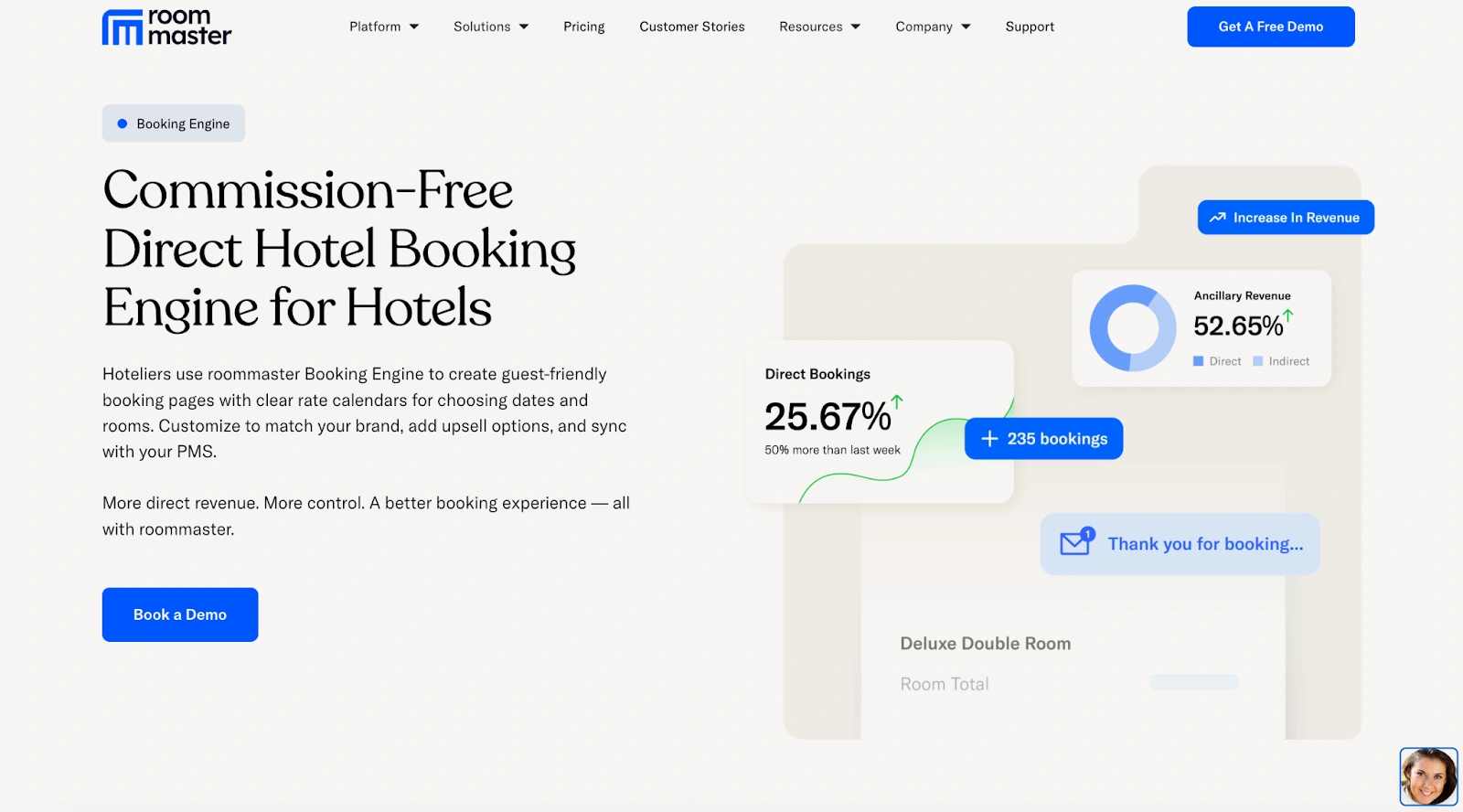
The roommaster Booking Engine turns your hotel’s website into a powerful tool to enhance direct bookings with its mobile-first design and real-time synchronization. It offers an interactive rate calendar that makes it easy for guests to find the best dates and prices, reducing the chances of losing them to other booking sites. This engine fully integrates with the property management system, keeping inventory and rates perfectly aligned across all channels and eliminating the risk of double bookings.
Customization options allow hotels to match the booking experience with their brand identity by creating personalized URLs and custom booking engines for different guest segments. This flexibility gives hotel owners greater control over the reservation process and helps target specific markets. In fact, hotels that adopt the roommaster Booking Engine often report a 15-30% shift in direct booking performance, cutting reliance on online travel agencies and saving commission costs.
The system also opens strong upselling opportunities by promoting packages, room upgrades, and extras during booking, which helps increase direct revenue while building long-term guest relationships.
{{booking-engine-three}}
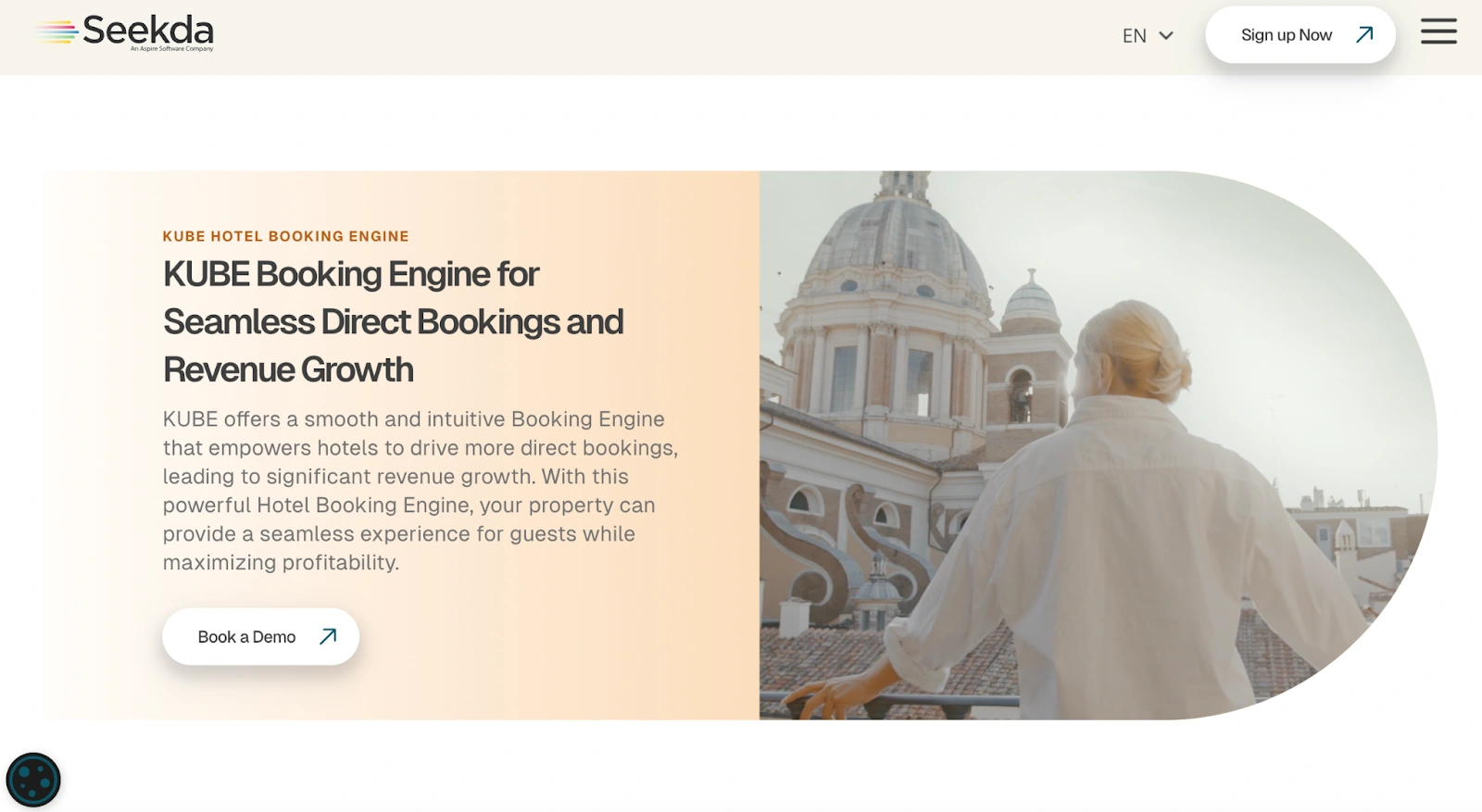
The KUBE Booking Engine by Seekda offers a secure and customizable booking platform that drives direct bookings while increasing hotel revenue. It features flexible payment options like Google Pay and Apple Pay to improve convenience.
KUBE allows hotels to personalize the booking experience with custom branding, dynamic banners, and voucher codes. It supports seamless integrations with tools like TrustYou and European Travel Insurance, delivering a user-friendly and trusted online booking engine.
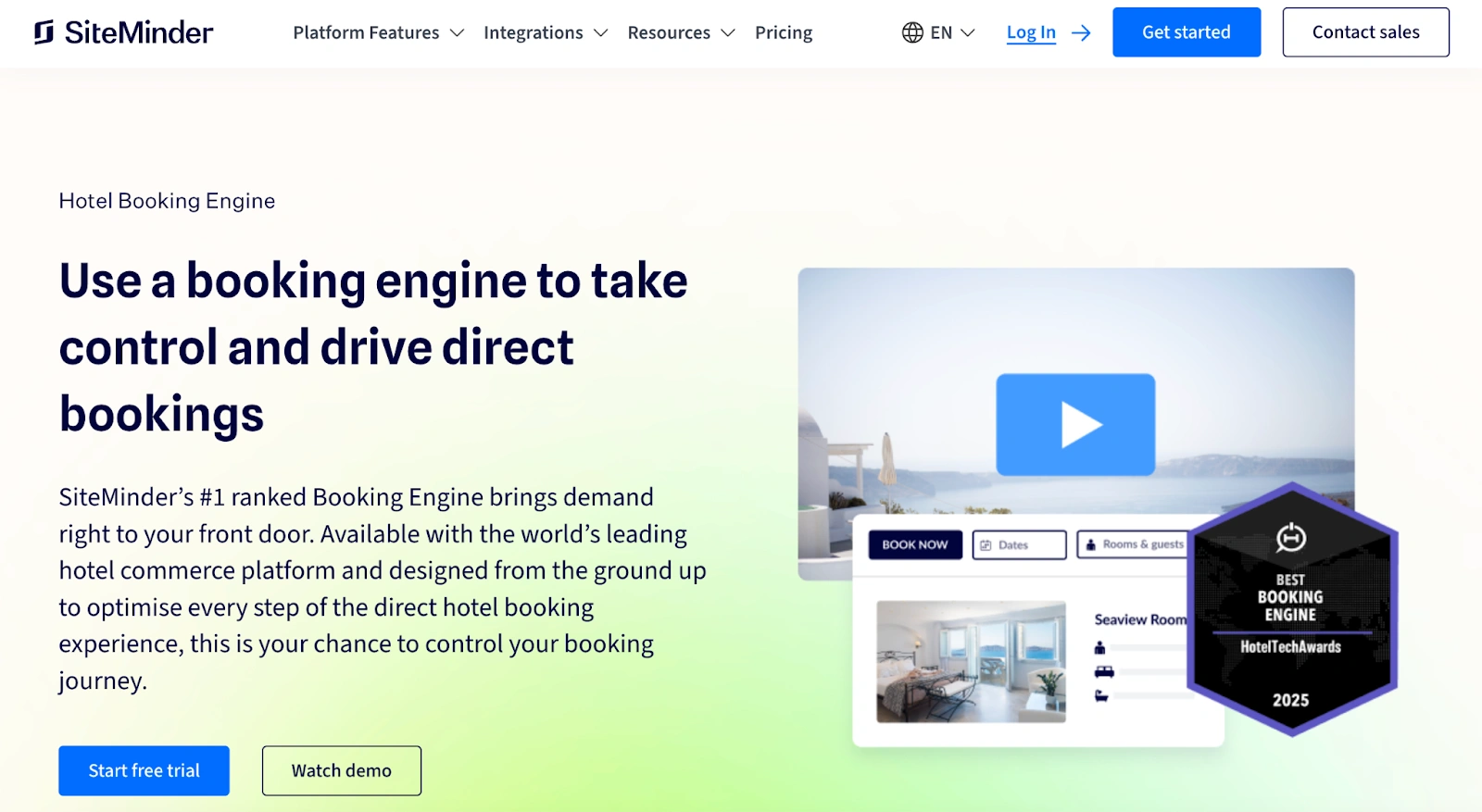
SiteMinder’s Booking Engine gives you the power to drive direct bookings while cutting down on OTA commissions. Built into a powerful hotel commerce platform, it makes the booking process faster, smoother, and more profitable.
With a mobile-first 3-step booking flow, social media integrations, and dynamic pricing tools, it turns casual visitors into confirmed guests. Hotels using SiteMinder report an average 63x ROI on direct hotel booking engine software.
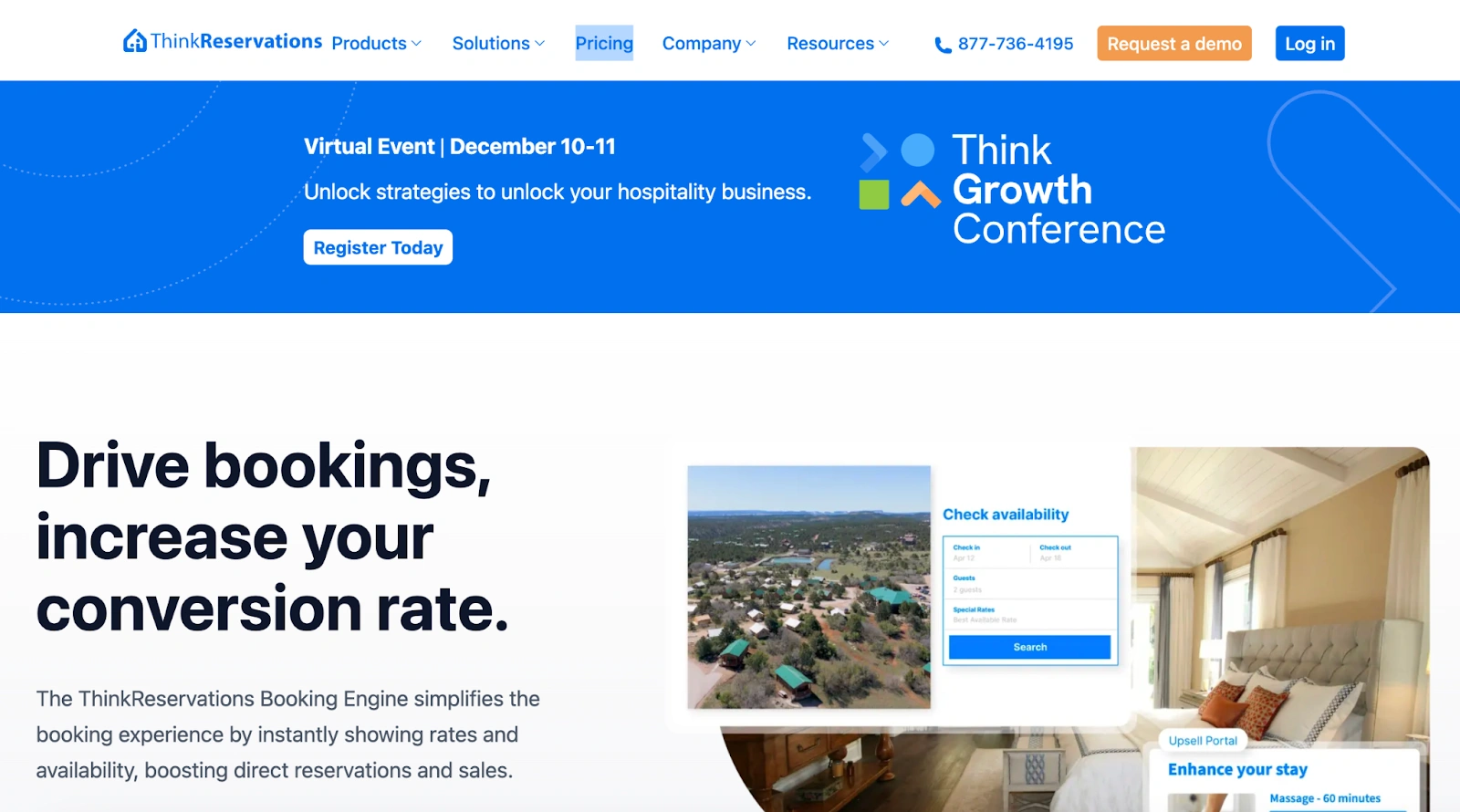
ThinkReservations offers a powerful hotel booking engine built to simplify your booking process and drive direct reservations. It delivers a fast and intuitive guest journey with real-time availability, automatic rate adjustments, and personalized upsell options.
The system works across all devices, supports customized branding, and includes built-in tools for promotions and direct booking incentives. The platform also automates guest communication, deposits, and task generation for smoother operations.
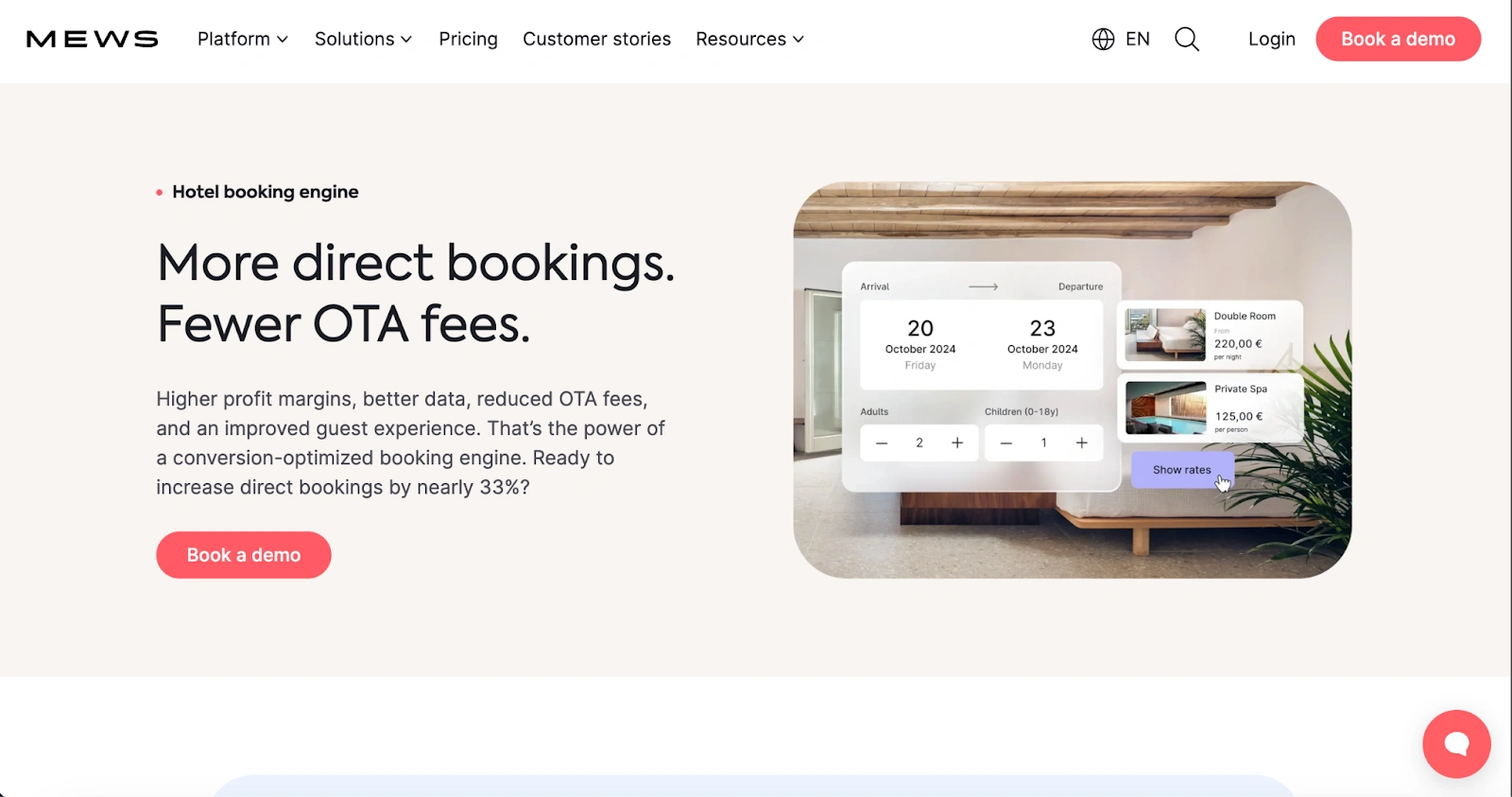
Mews Booking Engine helps hotels reclaim control over their revenue by cutting down OTA fees and boosting direct bookings by nearly 33%. It provides a fast, clean 4-step booking process designed to work across any device and supports local currencies, upselling options, and even third-party bookings.
With secure payments, customizable offers, and support for non-room bookings, it increases profit margins and improves the guest experience from the first click.

The Profitroom Booking Engine 360 is designed to push your direct bookings into high gear while reducing your OTA reliance. With real-time room availability, secure payment integration, and a fully responsive, guest-centric interface, this platform gives hotels a powerful tool to convert visitors into confirmed bookings.
From upsells and vouchers to automated cart recovery and AI-powered efficiency, it delivers on both profitability and user experience without increasing your team's workload.
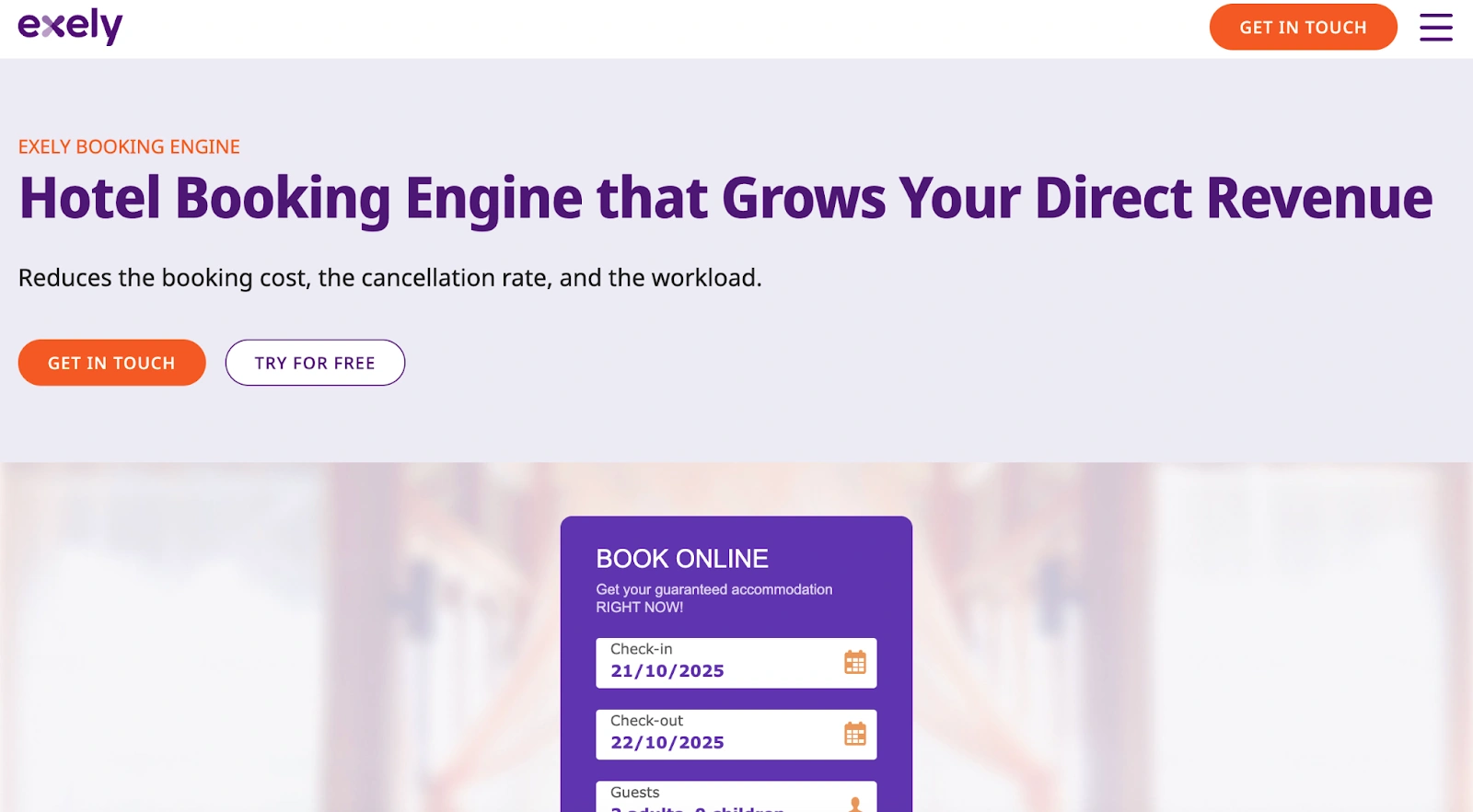
The Exely Booking Engine is a high-performance direct booking solution designed to reduce booking costs, lower cancellation rates, and streamline hotel operations. With powerful tools like Rate Match, multi-room combination booking, and automated upselling,
Exely helps convert more website visitors while maintaining price parity with OTAs. Features like loyalty programs, Google Free Booking Links integration, and flexible rate restrictions ensure a fully optimized direct sales experience.
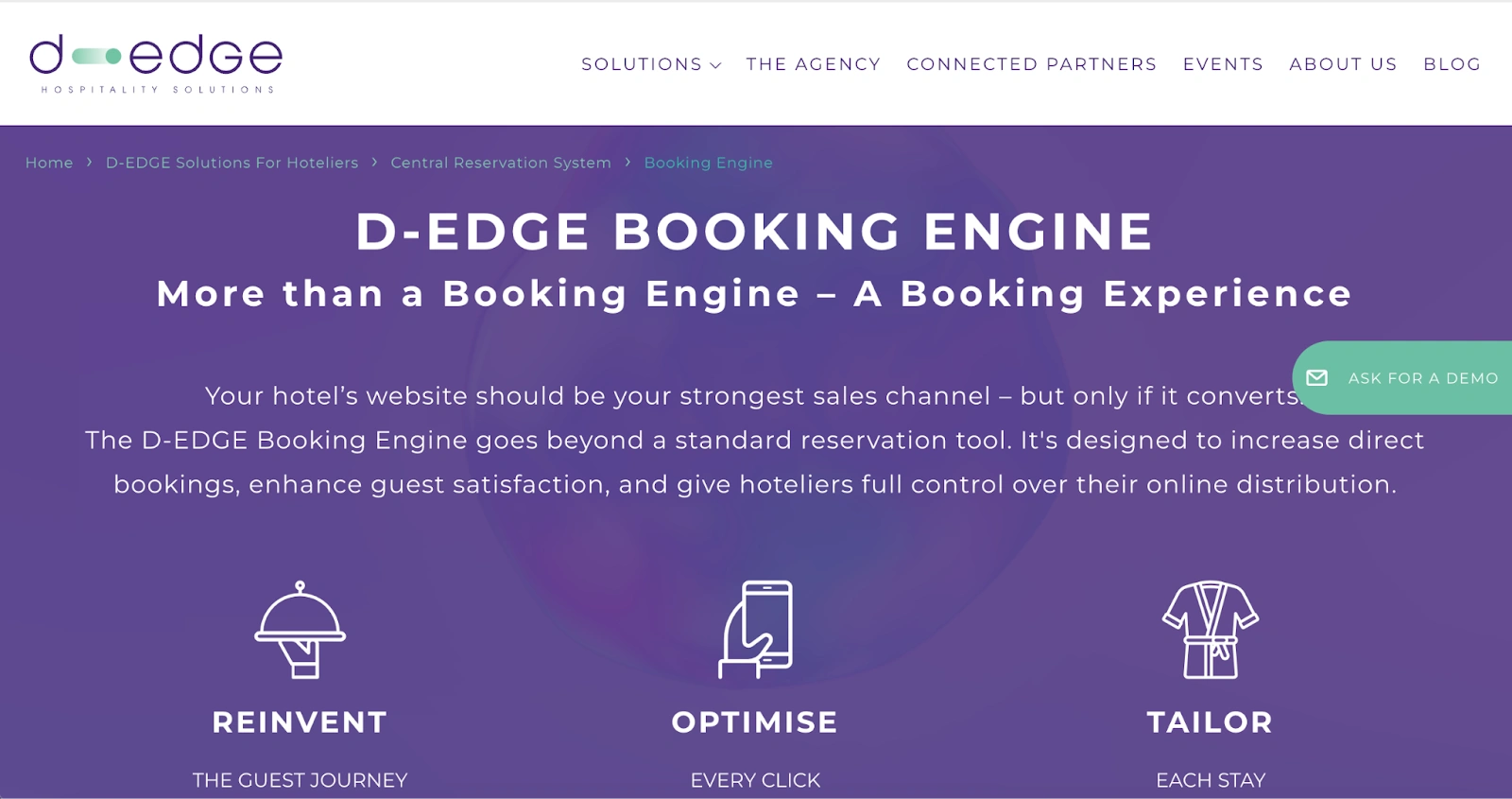
The D-EDGE Booking Engine transforms your hotel website into a seamless, high-converting direct booking channel. Designed for a fully integrated and brand-consistent experience, it ensures guests never leave your domain.
With native CRM integration, mobile responsiveness, and smart personalization, the engine tailors every booking journey to increase loyalty and maximize conversions.
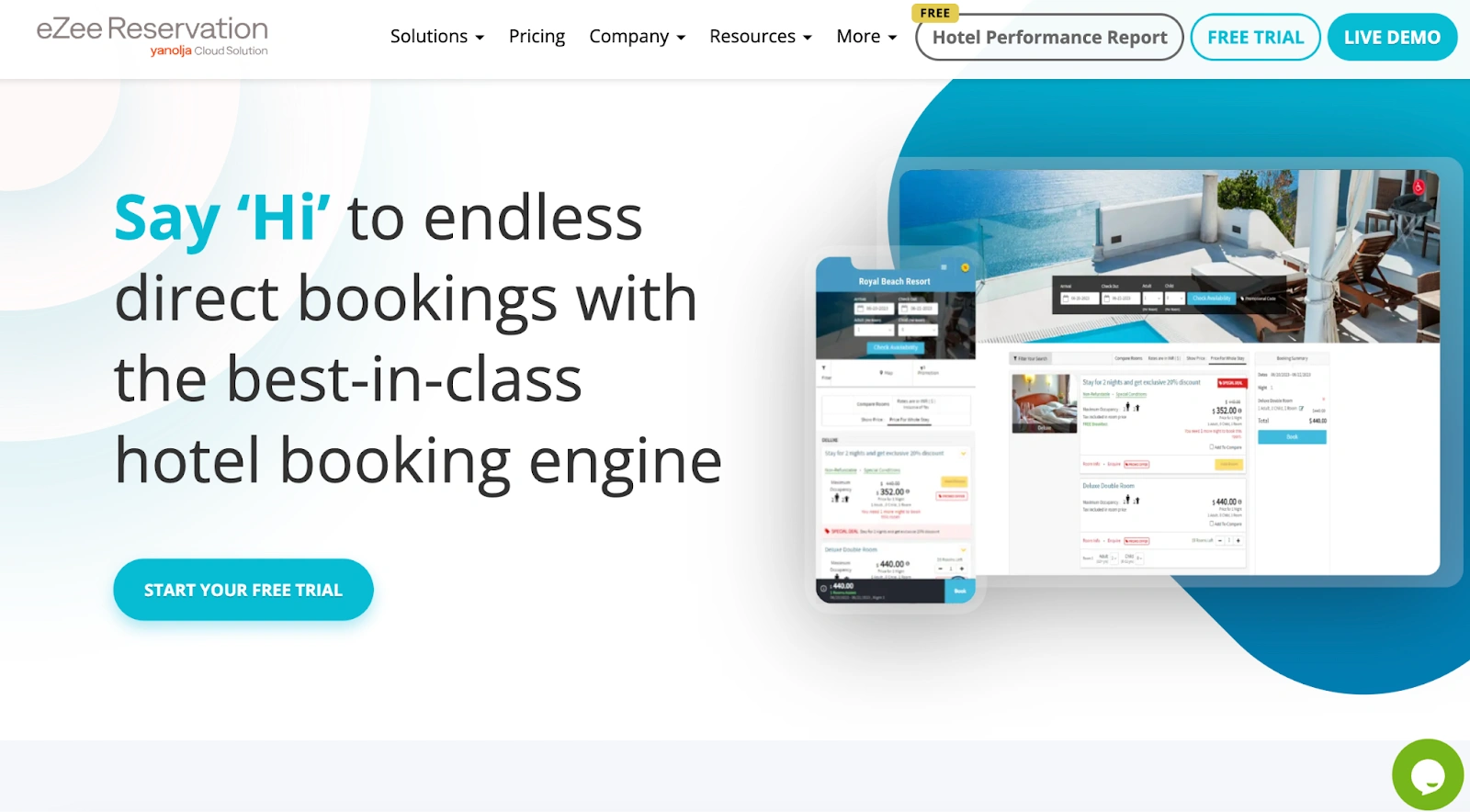
eZee Reservation is a robust, mobile-friendly booking engine designed to maximize direct bookings and reduce dependency on OTAs. With seamless website integration, customizable plugins, multi-language and multi-currency support, and over 60 payment gateway integrations, it empowers hotels to boost revenue and enhance guest engagement.
Features like yield management, upselling, affiliate tracking, and automated guest communication make it a flexible and powerful tool for all accommodation types.
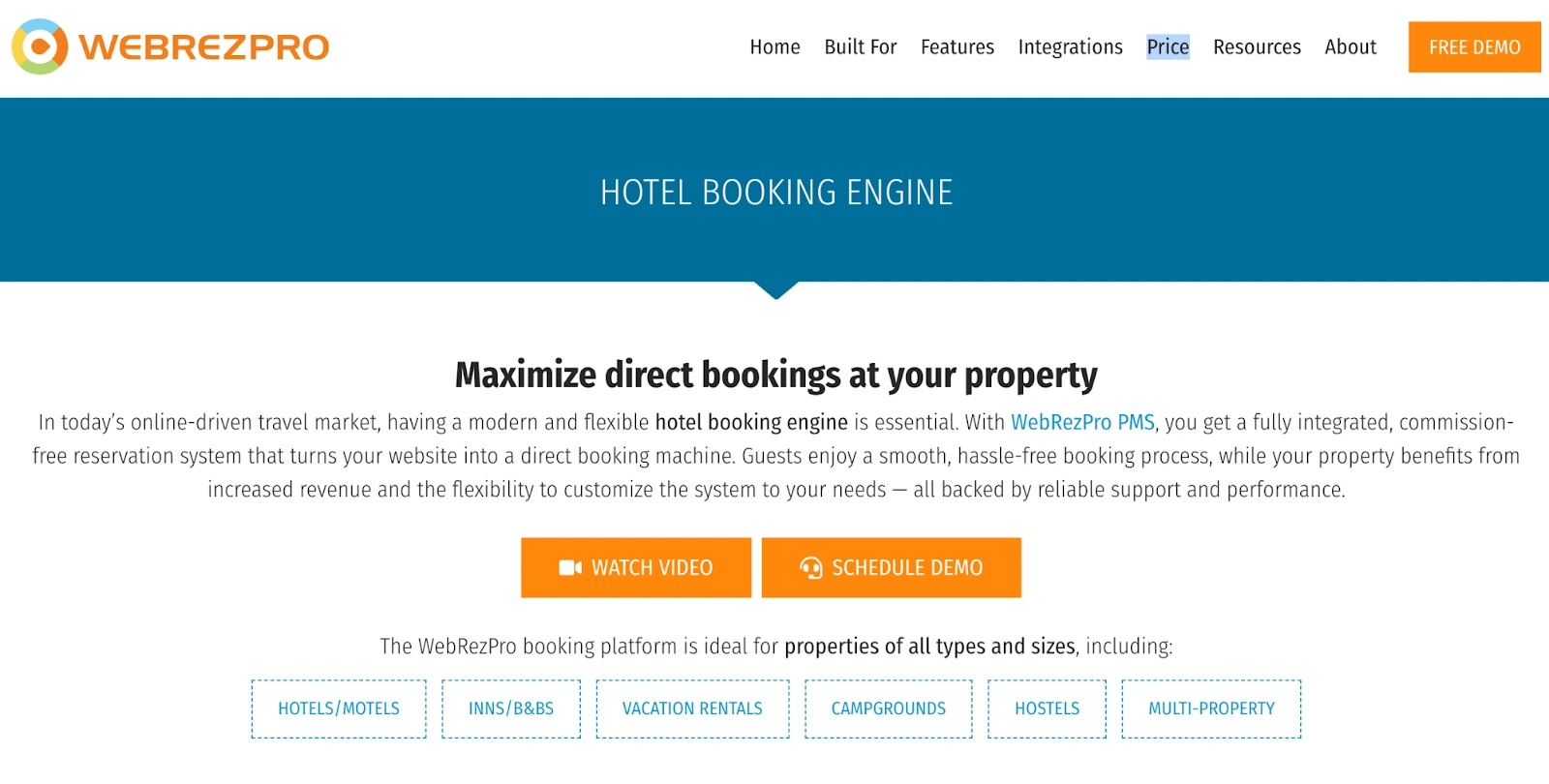
WebRezPro offers a fully integrated, commission-free booking engine that transforms your hotel website into a powerful direct booking channel. Designed for all property types, it features customizable branding, real-time PMS integration, ADA-friendly accessibility tools, and an intuitive mobile experience.
With features like upselling, interactive booking maps, and secure integrated payments, WebRezPro streamlines the reservation process while increasing revenue, enhancing guest satisfaction, and reducing third-party reliance.
{{booking-engine-two}}
When it comes to choosing a hotel booking engine, one of the first decisions you’ll make is between a commission-based and a commission-free model. The difference might seem obvious, but the impact on your revenue is anything but small:
Each model has its place depending on your business size, seasonality, and booking volume. If your goal is to reduce third-party dependence and own more of your guest relationship, then a commission-free hotel booking system could be a smarter long-term move.
Independent hoteliers face many challenges when their hotel booking engine does not connect smoothly with other systems. These gaps create extra work for staff and risk losing valuable direct bookings that could boost revenue. When systems fail to communicate, guests can experience slower check-ins or booking errors that hurt satisfaction.
A fully integrated hotel booking system like roommaster helps your property manage rates, availability, and reservations all in one place. This reduces manual errors and keeps your team focused on delivering great guest experiences. When the system updates instantly, you gain better control over your inventory and avoid double bookings during busy periods.
Ready to see how roommaster can help your hotel? Book a demo today!
The best booking engine offers real-time availability, easy payment options, mobile support, and seamless PMS integration. It fits your property size and guest needs while driving more direct bookings efficiently.
A booking engine is software that allows guests to check availability and reserve rooms online. It connects with hotel systems to manage inventory and payments instantly and securely.
Costs vary widely based on features, property size, and provider. Some charge monthly fees, others take a commission per booking. Expect prices to range from a few dollars to several hundred dollars per month.
You don’t always need a PMS, but integration with one, such as the roommaster Booking Engine, helps prevent double bookings and syncs reservations automatically. It makes managing rooms and guest details much easier and error-free.
{{cta-strip}}


The transition to roommaster is straightforward and efficient. Our implementation team handles data migration including reservations, guest profiles, and historical information.
See how roommaster's unified platform can work for your property. Our team will walk you through features tailored to your specific needs and operations.